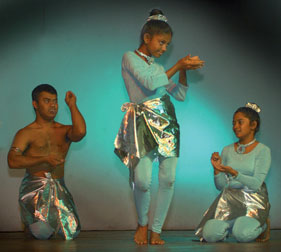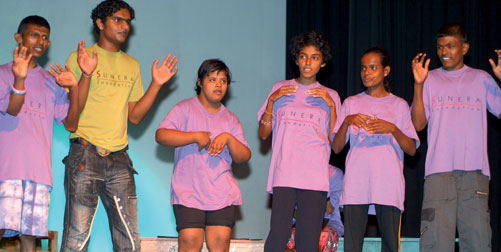Let us tell the wind to take its own course
By Ranga CHANDRARATHNE
Recently we had the opportunity of spending a couple of hours amidst
schools of butterflies. It was because of the finals of the drama
competition conducted by the Sunera Foundation to select three dramas
out of the six selected for the final round. It was on November 26 at
the S.de S Jayasinghe hall in Dehiwala.
 |
|
Breathtaking
performance |
It prompted us to take a moment out of our hectic lives and the rat
race to thing about our differently-able nature and to look back on
ironic nature of our system of values. That dance and acting on the
stage questioned the morale of the day. In essence, it stimulated us to
think about our differently -able nature. We were in the audience to
watch performance by differently-able children and to encourage and make
them happy. Still the memory flashed about the marvels of the
performance, the apt lighting, background music which synchronised well
with the performance on the stage that virtually took us to a different
and unknown territory.
How could these free performances by differently-abled children bring
abut such a sublime happiness in the audience and how could another on
the stage which we watched after purchasing tickets worth thousands
rupees more appreciable than these.
We watch roses and appreciate their beauty and fragrance. But we
would never try to count the petals in the rose. Though a rose may have
a certain number of petals, number of petals in each and every rose
would not be the same. We do not consider it as a defect of the rose or
consider that the rose is differently-abled.
Rare creations of nature would occur and their birth is so complex.
Though they look like deficiencies, they would act marvelously. This
gift of nature is equally valid both to animals and flora and fauna.
There are instances where ill-grown plant would yield abundance. Some
trees looked like dwarfs would not fail to give a good yield. We still
talk about Socrates' crooked nose. It was a gift of nature. Therefore,
we should be aware of potentials of a differently-abled child.
But, do we have the enabling environment for such a child to realise
his/her potentials? How far we would be concern about the wellbeing of
such a child?
The theme of the first drama was the tragic experience of a mother of
a differently-abled child. The mother who leads a mechanical life within
the conventional marriage gives birth to a differently-abled baby girl.
She wants to give a good education to a grow ing child. But the
conventional schools and system of education refuse to admit the child.
Mother becomes depressed. Differently-abled child's mother would be
anxious and depressed not because she lacks financial means. She becomes
helpless in confronting the issue of social security for the child.
There is no common programme to take care of the differently-abled in
Sri Lanka and therefore, parents worry about the future of their
children and what would become of them when they are no more. Is such a
mother suffering from anxiety strength enough to look after such a
child?
We felt that the performance of differently-abled children would
demand more than the mere attention of society. It was like an appeal to
a country blind of differently-abled issues. We thought whether there
was a programme to make an enabling environment for differently-abled in
Sri Lanaka let alone addressing the issues of education and employment.
 Has the issues of differently-abled been taken into consideration in
creating public facilities? Is there accessibility for differently-abled
to public places, high rises, apartments? Can a differently-abled use
even toilets in the public places? We felt that Sunera foundation has
opened up window to raise awareness on such issues. Has the issues of differently-abled been taken into consideration in
creating public facilities? Is there accessibility for differently-abled
to public places, high rises, apartments? Can a differently-abled use
even toilets in the public places? We felt that Sunera foundation has
opened up window to raise awareness on such issues.
A child's inherent abilities can be identified only by paying
attention to the child. Sunera Foundation has made a substantial
contribution in this area. Much -needed confidence and hope has been
instilled in children through the process of training them for
performances. The art that we should learn to pay attention to such
children and to help realise their potentials is love.
Sri Lanka has a tradition of delaying performance and the curtain
would often open while the audience would snore. But we entered the
Samanalayala on time.
Over nine hundred children participated in workshops conducted by
Sunera Foundation throughout the county and six dramas selected for the
final round was staged on November 26 and 27.
Within the couple of hours we spent in appreciating the performances,
we heard the echoes of spirits of differently-abled and their parents.
The enthralling tunes of songs such as " Noya Gaman...hamana athata
...hamanna nohakida sulagata" ( couldn't the wind take its own course)
added colour to the performance.
It was at this point we realied the foundation that Sunera build for
the welfare of the differently-abled and to make their day brighter.
|

